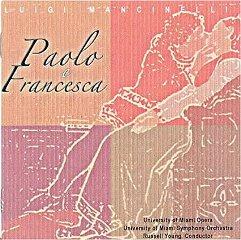Luigi Mancinelli - Paolo e Francesca (2005)
Luigi Mancinelli - Paolo e Francesca (2005)

1 Un corteo di palombe! 1:45 2 Il mio falcon 4:07 3 O dolcile mil falco 1:16 4 Maggio, bel Maggio 4:03 5 Dite: da lunga stagione 3:23 6 O superbezza 0:52 7 Sempre, siete la rosa piu rara di Romagna 2:34 8 Sirgnori miei 1:27 9 Cessa, matto, che fu? 6:06 10 Paolo, che recerchi? 6:17 11 O gelosia 3:16 12 Dove n'ite, Madonna? 5:17 13 Ravennate, bada! 3:30 14 Sant'Uberto! Sant'Uberto! 3:38 15 Alla cuna dell'Aurora 1:46 16 Perche fuggite, Francesca? 8:26 17 Ciel! 0:58 18 Poi che convein 4:47 19 Per l'inferno! 0:33 20 Paolo, dove sei? 3:19 Nicholas Perna (Tenor) Rosa Vento (Soprano) Frank Ragsdale (Tenor) Leo Skeffington (Baritone) University of Miami Opera Theater Chorus, University Of Miami Orchestra Russell Young - conductor
Luigi Mancinelli was a noted Italian composer of works for the stage, concert hall and church as well as for the early cinema. After studying in Florence, he served as an orchestral cellist before becoming a conductor at the Teatro Morlocchi in Perugia. As if to anticipate the celebrated rise to fame of Arturo Toscanini, Mancinelli stepped from his role as cellist to the podium to conduct Verdi’s Aida, a feat which earned him an engagement as conductor at the Teatro Apollo in Rome where he appeared until 1881. Subsequently, his growing fame took him for conducting engagements to Paris, Milan, Bologna, Venice, London, Madrid and the Metropolitan Opera in New York. During his nine seasons as conductor there he led the first Met performances of Werther, Falstaff, Samson and Dalilah, Le Cid, The Magic Flute, La Boheme, Don Giovanni and Ernani, as well as his own opera Ero and Leandro. He also conducted in Rio de Janeiro, Buenos Aires and Lisbon – where he committed suicide in the aftermath of a bankruptcy. His works for the stage reflect a dramatic temperament. His first opera Isora di Provenza succeeded in Bologna in 1884, but failed in Naples in 1886. His next opera, Ero and Leandro, brought him international attention via premieres in London and New York, its libretto by the admiring composer and librettist, Arrigo Boito. Paolo and Francesca from 1907 failed – in part due to the unfashionable idealism and classicism of its libretto in an era when the ideals of verismo opera, championed by Mascagni, Leoncavallo and Puccini, were exciting audiences every where. However, the music of Paolo and Francesca is both rich in texture and has moments of real inspiration. --- Editorial Reviews, amazon.com
download (mp3 @320 kbs):
yandex 4shared mega mediafire zalivalka cloudmailru ge.tt
